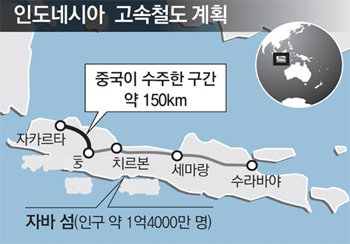Japan unleashes criticism against China after losing Indonesian bullet train project
Japan unleashes criticism against China after losing Indonesian bullet train project
Posted October. 01, 2015 07:24,

It is completely unthinkable based on common sense, but there is a country like China that makes such a proposal. We think there is a highly bumpy road ahead, and doubt whether it will be implemented properly in reality.
Yoshihide Suga, Japans Chief Cabinet Minister and spokesman for Tokyo, unleased criticism that was close to cursing against China, after hearing that China successfully won a bid to construct a high-speed railway in Indonesia by beating over Japan on Tuesday. It is quite unusual, considering that he made the criticism in an official press conference.
The high-speed railway project in Indonesia calls for the construction of 150 km high-speed railway linking Jakarta and Bandung on the Island of Java, and Japan was already gaining the upper hand by starting a survey as early as in 2011. However, as China entered the bid belatedly in March this year, the project was staged as a two-way race between China and Japan.
As competition intensified, the Indonesian government put forward a new condition that the government would not shoulder any budgetary burden or provide debt payment guarantee in early September. As a result, Japan was concerned about the risk of failing to redeem its investment, but Beijing accepted the condition without hesitance, and successfully secured the first export of its high-speed railway system. The construction costs that China proposed was reportedly just one third of what Japan demanded.
Japan is reportedly in deep shock after losing the competition for the bullet train project to China. Suga openly criticized right in front of Sofyan Djalil, the Indonesian minister of land development planning who was visiting Tokyo in his capacity as a special envoy of Indonesian president Joko Widodo on Tuesday, saying It is hard to understand, and we deeply regret.
Lying behind Japans overreaction to the deal is a sense of crisis that it now has loopholes in the high value-added infrastructure market including high-speed railways that the island country has been almost monopolizing in Asia. Kyoto News Agency said, Japan has effectively lost a core project to China, with which it is competing over infrastructure development projects around the world, adding, It deals a blow to the Shinzo Abe administration that is using export of infrastructure as a pillar of growth strategy. The Abe administration aims to increase its export of infrastructure systems including railways and energy from 6 trillion yen (49.9 billion US dollars) in 2013 to 30 trillion yen (249 billion dollars) in 2020.
Watchers in Japan also raise concern that China might seek to change the rules in the infrastructure market by banking on the latest victory. The Nihon Keizai Shimbun said, Tokyo will have no choice but to change its strategy for infrastructure export that it has been implementing by banking on the means of its official development assistance. It means that Japans export strategy, in which it exports infrastructure by providing loans to a country and prompts the countrys government to make payment guarantee if a problem arises, now faces a stumbling block.
The Mainichi Shimbun said, China, which seeks to establish a One Belt, One Road (Silk Road of the 21st Century) economic bloc, is trying to export infrastructure to Southeast Asia and Europe, predicting, By leveraging the acquisition of the project, China will expand export of infrastructure using funds from the Asian Infrastructure Investment Bank.
bae2150@donga.com
Headline News
- Harris ‘first female president’ vs. Trump ‘again 2016’
- N. Korea builds 11-meter rampart after road demolition
- Democratic Party eventually agrees to abolish financial investment income tax
- Drug smuggling is seized twice a day on average this year
- Surrounded by ‘uniforms,’ NHL’s first female coach ‘time-out’







